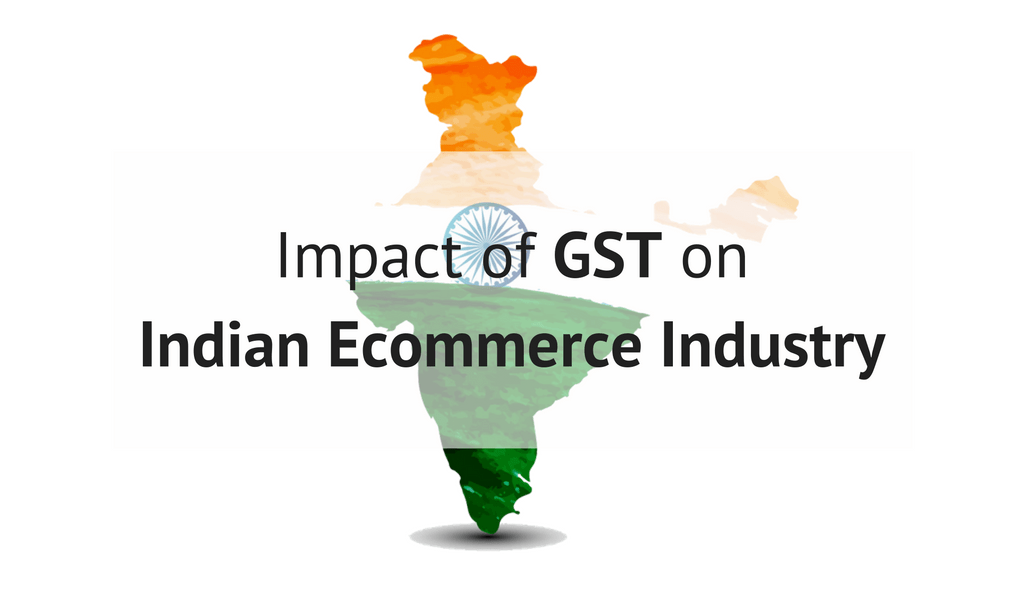Impact of GST on Indian Ecommerce Industry
-
 Nidhi Arora
Nidhi Arora
- 8 years

GST has been rolled out in India finally on 1st July, 2017.
Read our latest blog on the Impact of GST on Indian Ecommerce Industry after Implementation.
Indian Ecommerce sector has seen a rise in last 5 years.
The sector is galloping towards more revenue & shipments compared to its initial infant-hood, so it is expected to be there in a jiffy where it can arrest the customers’ mind & eyes like never before. And, it is also predicted that e-commerce sector will continue to grow extraordinary and projected to be the next BIG industry in India.
Indian Parliament took an historic call yesterday (3rd August 2016) and the Goods and Services tax (GST) draft bill has cleared all hurdle to be now a reality for Indian Market. This bill considers all e-commerce transactions under the field of the scheduled tax.
According to the GST Bill, every operator will furnish an electronic statement of all amounts collected towards outward supplies of goods and services during a month. However, the scheduled rules might address the tax related problems that e-commerce companies have been enduring in different states & it brings its own set of issues.
If you do belong to an e-commerce platform or come under a list of sellers available on a platform, this blog is compiled for you to understand about the draft GST & its impacts.
Impact of Compliance & Accounting Liability
According to Himanshu Sinha (partner at law firm Trilegal), “Until now the tax liability was of the seller and not of e-commerce platforms but now the government will pass on the responsibility to the e-commerce operator. This means the cost of compliance will go up for companies.”
Under this GST draft bill, the e-commerce companies will be accountable to accumulate TCS (tax collected at source) on the basis of deliveries of goods or services through the supplier. E-commerce firms would be required to file both monthly & annual returns. Moreover, the supplies of goods, reported by e-commerce Company will be get matched with the details provided by the supplier in his return for outer deliveries. And, if any mismatch will be observed, the output accountability of the merchant will be re-considered.
It goes without saying that it would serve like an accounting nightmare for e-commerce companies. Whereas a uniform tax law will encourage e-commerce companies to equalize the tax in contrast to output tax, it is supposed to be a supplementary burden on e-commerce platforms like Snapdeal, Flipkart, Amazon, etc…
A Grave Impact on Small Sellers – Working Capital Issues
As the GST has been scheduled to immune small traders who’re having revenue less than Rs. 10 Lakh in a year, so it is supposed to accumulate tax on each transaction by e-commerce companies and it doesn’t matter how small the seller might be.
It implies that a small seller available on e-commerce platform will perpetually culminate in paying tax and would later be able to apply for a refund. This will only give a birth to work capital issues for the small or medium businesses working on very constricted working capital.
Impact on Cash Flow
According to Nihal Kothari (partner at law firm Khaitan & Co) – “TCS can be a major cash flow disadvantage for e-commerce firms especially in the case of cash on delivery or orders being rejected later. E-commerce firms will have to plan their accounting and cash reconciliation cycles accordingly.”
The e-commerce order cancellation rate or order return rate is generally about 15-18% in India. Adding further, more than two-third of the e-commerce transactions still rely on COD. Also, the cash settlement comes about seven to fifteen days later. Thus, if an e-commerce firm will do any tax deduction at the source, it will require paying the tax amount from their own capital.
Impact on Freebies and Discounts
Most of the e-commerce firms sell their products on discounts or offer some perks with specific product purchases. According to GST, freebies are supposed to be taxed, as a result, it will impose an additional burden on the sellers. For example, if Amazon, Flipkart or Shopclues sell a product with a heavy discount, they will have to pay the tax on the original price they bought it from the supplier. Therefore, they will now have to endure that extra tax liability on their own for offering perks & heavy discounts.
Clearly, the impact of GST appears to be a mixed bag with advantages as well as disadvantages, where the advantages far outweigh the observed disadvantages. GST is expected to offer the much required legal framework for e-commerce companies to work in India.
Voice of Who is Who on GST Impact on Indian Ecommerce
“Even though GST means new ways to calculate tax and some bit of extra work in administration of business, I think it is great for online businesses because it brings clarity and tax obligations. Surprisingly, GST will also open new markets for online commerce because, today, due to complexities of entry tax and other processes, customers in some states cannot order everything from online shopping destinations.”said Vijay Shekhar Sharma, founder and CEO of Paytm.
“It is huge for somebody like us. Right now, what happens is, given the nature of our constitutional structure of our country, movement across states is actually very, very complex,” said Ashish Goel, CEO and co-founder of Urban Ladder that deals with online ordering and delivering of furniture.
“For instance, the bill states that the e-commerce companies will have to collect taxes from the sales made on that portal, and they have to file monthly and quarterly returns. So they have to take on the burden of collection and paying to the government and monthly/quarterly returns to make sure they’re not evading taxes,” said Entrepreneur Mohandas Paiwho has funded a number of start-ups.
Kishor Biyani, CEO, Future Group, Called the Goods and Services Tax (GST) a ‘path breaking’ development, he said the system will help India become one big unified market. He said it will benefit Logistic, Retail and Consumer Goods will benefit the most from GST.
Download Blog











